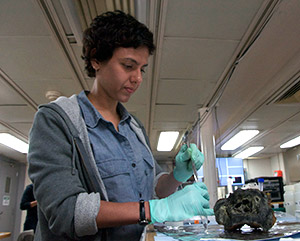Ileana Pérez-Rodríguez,
Post-doctoral researcher, Carnegie Institution of Washington
 Ileana Pérez-Rodríguez, Post-doctoral researcher,
Ileana Pérez-Rodríguez, Post-doctoral researcher,
Carnegie Institution of WashingtonHow did you get your start as a microbiologist?
I did my undergraduate studies in general biology at the University of Puerto Rico. Most people there go through their natural sciences department for medical school, but I knew I didn’t want to be an M.D. I wanted to be an ecologist. I did some research on fungi associated with orchids, among other things, which was pretty neat, but I knew I wanted to study something related to the ocean. I started applying for programs, and got the chance to study with Costa Vetriani at Rutgers. I have to admit, though, I didn’t know much about hydrothermal vents before I met Costa! I had heard of them, but I didn’t know about chemosynthesis.
How did you know you wanted to focus on something marine-related?
I grew up on the coast, so I always had access to the ocean in that way. I took a marine biology course in undergrad, and realized I really like fieldwork. I hadn’t had much microbiology experience, but I had done stuff like measuring levels of E. coli in streams near cattle farms around Puerto Rico. Once I started the program at Rutgers, I really got into the field. I think most other people who are starting out in biology are fascinated by bigger, more charismatic organisms, but I’ve always been drawn to studying evolution, and vent microbes are an ideal system for examining that. A lot the microbes at vents, for example, are similar to what we think were the earliest forms of life on Earth. They’ve been here for a long time, and they’re probably going to be here long after we’re gone. I feel really lucky that I get to study these organisms.
What’s it like to do fieldwork on something you can’t even see, though?
It’s definitely different, but you still have a lot of great experiences in the field. When I was an undergrad, I took a great workshop with the Smithsonian Institution, and they took us out to the mangroves of Puerto Rico. That was my first real field experience. We got really dirty, the sediments were smelly because of the bacteria, but I got really into it. Being in a boat in the middle of the ocean for such a long period of time is a really cool experience, too. It just takes you out of your normal reality.
Have you done it before?
Yes, I was out here in 2007 and 2008. I was really excited then, and was focusing on how fun it was to be on the ship. Now, I’m more aware of how remote we really are when emergencies come up. I didn’t really think about stuff like that a few years ago. As for the experiments, I guess now that I feel more mature about my scientific approaches and the ideas I want to test, it’s a great experience to be able to come here and work on a project I’ve designed. It’s also a little scary, because you have one shot at it while you’re at sea—so you don’t want to screw it up! I also have a better appreciation for the huge effort that goes into planning a cruise. I think this one took three years to put together.
Do you think you look at fieldwork in a different way now that you’ve been doing it for so long?
Well, any knowledge you acquire in life lets you look at things in a slightly different way. With everything I’ve studied, I’ve started to see nature with a fresh set of eyes.
What do you like to do when you’re not in the lab?
Watching TV, reading, painting and drawing—not that I’m particularly good. I also just like to walk. I walk two miles to work every day, and walk home. Sometimes I just wander. In Washington, D.C., where I live, you can pretty much just pick any direction and start walking, and be entertained. That’s what I like about it. You can clear your head pretty quickly doing that.
Think you’ll stay in D.C.?
I would like to. There are a lot of science institutions there, which is very convenient. I really like doing research, using my time at my own convenience. I also enjoy writing papers and preparing experiments. I find the whole process fascinating. Some people hate it, but I like going through the steps, from planning out ideas, to gathering information, figuring out the logistics of experiments, overcoming technical challenges, and so on. It’s a nice puzzle, and when you’re done, you end up finding something out about nature. It’s really gratifying.
[Back
to top]
|

